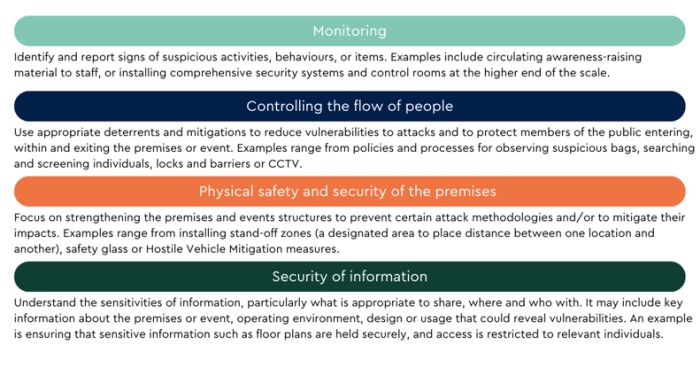- in European Union
The Terrorism (Protection of Premises) Bill, also known as Martyn's Law in honour of Martyn Hett who died in the 2017 Manchester Arena attack, will when enacted improve the UK's security by obliging those responsible for certain premises and events to plan how they would respond to a terrorist attack in or near to their property. Persons responsible for larger premises and events must also take steps to reduce the property's vulnerability to terrorist attacks. Premises fall within the scope of the new regime if they are used mainly for qualifying purposes described at section 2 below and, for the standard duty, it is reasonable to expect that from time to time 200 or more people might be on site at the same time. For the enhanced duty obligations to apply instead, it must be reasonable to expect that from time to time 800 or more people would be on the premises at the same time.
1 WHICH EVENTS WILL BE AFFECTED?
The events that will be affected by the new regime will be those held at buildings which are not already classed as "enhanced duty premises", which are open to the public, where it is reasonable to expect that 800 or more people may be present on the premises at the same time, and where staff will be employed to control access to the premises, such as by checking guests' tickets.
2 WHICH BUILDINGS WILL BE AFFECTED?
For premises to fall within the new regime, they must be wholly or mainly used for one or more of the uses set out in Schedule 1 and must not fall within the exemptions set out in Schedule 2 (see box).
Which types of use fall within the regime?
- Shops
- Bars/ restaurants where the premises sell food and drink mainly
to be consumed on-site;
- Entertainment and leisure venues;
- Sports grounds (note that some of them are excluded, mainly
those where there are no staff employed on-site);
- Libraries, museums, archives and galleries open to visiting
members of the public;
- Public halls or conference centres which are open to the
public;
- Visitor attractions with cultural, historic, touristic or
educational value;
- Hotels, hostels and holiday parks;
- Places of worship (note that these will only ever be required
to comply with the standard duty, regardless of visitor
numbers);
- Health care premises such as hospitals;
- Bus, coach, tram or train stations (except those for trolley
vehicle systems);
- Aerodromes (apart from purely military premises);
- Childcare premises such as nurseries; primary and secondary
schools; and further education colleges (note that these will only
ever be required to comply with the standard duty, regardless of
visitor numbers);
- Higher education institutions; and
- Premises used by public authorities to provide facilities or services to visiting members of the public.
Excluded uses
- Houses of Parliament in any of the UK's nations;
- Public parks, gardens and outside leisure or sports facilities
where there are no staff employed on site to control access;
and
- Transport premises which are subject to pre-existing transport security plans and regulations.
3 WHAT ARE THE NEW OBLIGATIONS?
3.1 For standard duty premises or qualifying events
Those responsible for qualifying premises or a qualifying event must, as far as reasonably practicable, ensure that appropriate public protection procedures are put in place to reduce the risk of physical harm being caused to people if an act of terrorism were to occur on the premises, at the event or in the immediate vicinity of the premises or event.
This would involve staff working at the premises being trained so that, if a terrorist attack took place, they could evacuate members of the public out of the premises or event; move people into the premises or into a safer place within the premises; stop people entering or leaving the premises or event by, for example, closing the shutters; and provide the necessary information in real time to individuals on the premises or at the event. The relevant Government guidance explains that the responsible person will need to consider what is appropriate and reasonably practicable for their premises, which will involve considering the nature of the premises and resources available. The regime does not require physical alterations or the purchase of equipment in relation to standard duty premises.
The Government Guidance includes the following example of reasonable and appropriate procedures for a 400-seat restaurant
Evacuation - There will be one route via through the main entrance that leads onto public pavement and another through a side door that leads into an alley.
Invacuation - bring individuals into the main restaurant area and, if needed, into a variety of staff areas.
Lockdown - nominated individuals knowing when (i.e. when their shift manager instructs them to) and how to quickly lock and barricade doors, close window shutters and turn off lights.
Communication – met by ensuring staff know who will enact procedures (shift manager) and planning how to communicate with customers present at the restaurant, were an attack to occur.
Supporting activity - new members of staff are provided a short awareness briefing on the restaurant's procedures at induction (alongside health and fire safety inputs).
Updating - The procedures are reviewed annually.
The responsible person for standard duty premises will be required to notify the regulator (the Security Industry Authority ("SIA")) when they become responsible for that premises, and when they cease to be responsible. The Bill provides for further regulations to be enacted if necessary to flesh out these requirements.
3.2 For enhanced duty premises and qualifying events
At the enhanced level, the responsible person must assess and keep under review a set of public protection procedures (and ensure that they are in place so far as is reasonably practicable) in order to reduce the vulnerability of the premises or event to terrorism, as at section 3.1 above. In addition, a number of public protection measures must be put in place, which must be tailored to those specific premises or event. More information is given in the relevant piece of Government Guidance.
The delivery of these measures will vary between different types of qualifying premises and events and may be implemented through staff procedures (including specific staff training), processes (such as introducing a bag search policy) or physical measures (such as installing and monitoring CCTV). The measures will also need to be delivered with the big picture in mind, for example, installing CCTV would not address a vulnerability if the staff had not been properly trained to perceive the likely threats. The four types of measure are as follows:

It will also be necessary to document compliance by preparing and maintaining a statement of the procedures that have been put in place, and an assessment of how those they are intended to reduce the risk of people being physically harmed if a terrorist attack happened on-site or nearby, and the premises' vulnerability to terrorist attack.
The responsible person will need to comply with a number of notification requirements in relation to the SIA, including notifying them when it becomes the responsible person, and again when it cases to be responsible; and providing a copy of the document described above to the SIA as soon as is reasonably practicable after it is prepared. If it is amended at a future date, the new version must be supplied within 30 calendar days of its revision.
As with the standard duty, the Bill provides for further regulations to be enacted if necessary to modify these requirements.
The Government Guidance includes the following example of reasonable and appropriate measures for a 1,200-capacity theatre
Procedures - Developing and implementing plans for public protection procedures and ensuring that they are routinely rehearsed
Staff training - Ensuring that induction and probation periods for new staff include awareness training packages for all those working at the theatre in roles relating to safety, security and counter-terrorism. Introducing interim tabletop activities and walk-through scenarios that are designed and led by designated individuals.
Monitoring -Developing policies for perimeter and entry checks as well as queue management and ticket checks
Communication - Using internal radio systems and mobiles for communication between relevant individuals working at the theatre
Flow of people - Employing a mixture of salaried and contracted door staff to sufficiently protect ingress and egress areas, and developing policies for suspicious or restricted items including bag checks and storage. Installing effective CCTV with an adequately staffed monitoring and control room
4 WHO WILL BE RESPONSIBLE FOR COMPLYING WITH THE BILL?
The person who has control over qualifying premises or a qualifying event will be the responsible person, often the tenant as it is likely to be in occupation. In relation to events, the responsible person will usually be the event organiser.
The Bill recognises that where more than one person could be said to have control of premises then they must, so far as is reasonably practicable, co-ordinate with each other in complying with any requirement imposed on them by or under the Bill. The relevant Government factsheet gives the following examples of such co-ordination and co-operation in the context of a landlord and tenant relationship:
Department store in a shopping centre - In a scenario where qualifying premises form part of other qualifying premises; for example, a department store within a shopping centre, the department store and the shopping centre must, as far as reasonably practicable, co-ordinate to ensure that they are individually, and cumulatively, compliant.
Smaller store in a shopping centre - The co-ordination requirements only apply to premises that fall within scope of the bill. This means that smaller premises with a capacity of under 200 that are located within qualifying premises do not have any statutory requirement placed upon them.
Structural alterations - Where the responsible person has identified that, in order to meet their legal obligations under the Bill, changes are required to the structure of the building, but their lease requires them to get the landlord's consent for any alterations. The freeholder is obliged to act reasonably in considering such requests.
Where the responsible person is a non-natural person, then it must designate an appropriate senior individual to take responsibility for compliance.
5 ENFORCEMENT
As regulator, the SIA will have various powers of enforcement including the ability to issue compliance notices, restriction notices and financial penalties for contraventions. The Bill also creates certain criminal offences: for providing false or misleading information to the SIA; for failing to comply with a notice; and for impersonating or obstructing an inspector.
6 WHAT IS THE LIKELY TIMESCALE FOR IMPLEMENTATION?
The Bill is scheduled for its report stage and third reading in the House of Commons on 9th December 2024. It will then need to be scrutinised, and further regulations will be needed to fill in some of the required details, such as deadlines for notifications to the SIA. It is thought that the Bill will be implemented in phases, starting with the standard duty in 2025.
7 CONCLUSION
Owners, tenants and managing agents of large buildings that are open to the public need to be aware that this new regime will be enacted in 2025 and that it will involve important changes to the existing regulatory landscape. The retail and hospitality sectors are the most likely to be impacted. For the UK's estimated 154,600 standard duty premises, this is likely to involve procedural changes alongside additional staff training. For the UK's estimated 24, 300 enhanced duty premises, depending on the property and its use, the new regime is likely to involve putting more complex arrangements in place and possibly making physical changes to a property to improve its preparedness.
The content of this article is intended to provide a general guide to the subject matter. Specialist advice should be sought about your specific circumstances.








